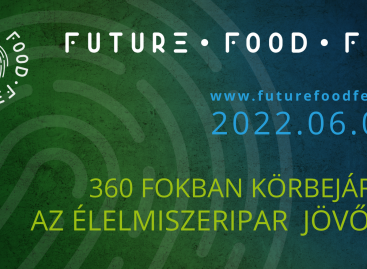Future Food Fest: An insight into the future of the food industry
Following three years of planning, the first Future Food Fest was organised on 9 June, calling the attention of Hungarian FMCG companies to the challenges of the future. One of these challenges can be that by 2030 there will be 9 billion people living on planet Earth.
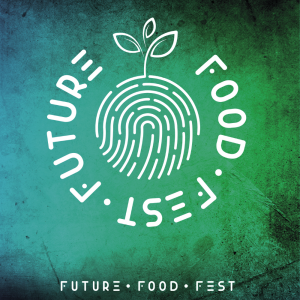
Dr Erzsébet Némedi, founder and executive director of Expedit Nodum Kft. organised the event to give Hungarian food companies a forum where they can discuss future trends and strategies.
Researchers need to come out of their ivory tower!

Dr. Erzsébet Némedi
founder and managing director
Expedit Nodum
Dr Erzsébet Némedi was the keynote speaker, and she spoke about how researchers and the food industry will have to cooperate more closely in the future, by this making food production more sustainable and competitive. The two parties must start speaking each other’s language for this. At the moment theory and practice don’t go hand in hand in the Hungarian food industry, even if there are already good examples of this in Western Europe.
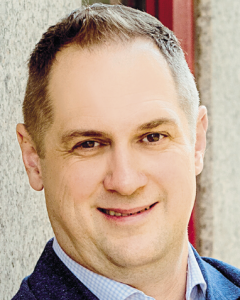
Krisztián Steigervald
generation research specialist and consultant
The second speaker was generation research specialist and consultant Krisztián Steigervald. He explained that many people think age defines a generation, but actually it is a collection of experiences. From a food perspective, what matters the most is how long members of a given generation will live. How we experience old age when we are children influences what we think about a product, a job or the future.
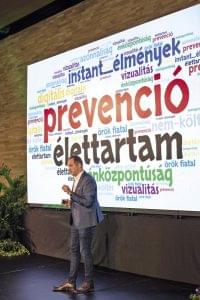
When making nutrition-, thus food-related decisions, conscious consumers go out from an assumption of how long those lengthen one’s lifetime and how much they contribute to life quality. Health is no more an objective to attain, but to maintain.
One topic, five viewpoints
Expedit Nodum Kft.’s research team gave a presentation about the future of food, from five different perspectives. Professor of biophysics and head researcher Dr Dénes Szász talked about younger generations turning towards food coming from well-controlled sources. As the world’s population is growing, we won’t be able to produce enough food at small farms and plants. Dietitian, nutrition specialist and researcher Bettina Czakó spoke about the significance of medicinal herbs, algae and fungi. Food industry uses medicinal herbs in an innovative way, and many types of algae contain essential Omega-3 fatty acids and micronutrients.

Plant-based diets contribute to the decrease of our eco footprint
Bioengineer, food technology expert and researcher Sándor Ferenczi chose functional foods as his topic. Manufacturers like to develop functional products, as they deliver significant market advantage, but at the same time consumers have high expectations from these. Physician and clinical research specialist Dr Gábor Petrik followed next, who shared his view that people don’t trust pharmaceutical products, but when it comes to food they don’t really pay attention to details. A well-compiled diet is essential for the right homeostasis of the human body. Food industry engineer, biotechnologist and clinical research specialist Dr Erzsébet Némedi was the last presenter from the team. She explained that sustainability in the food industry is a loop, where there is a healthy circulation of energy and resources, and the interests of all stakeholders are protected, while the level of byproducts and harmful substance emission is kept at the minimum.
Preparation works better than a crystal ball

Dr. Tekla Engelhardt
food engineer
Food engineer Dr Tekla Engelhardt gave a presentation about forecasting the future. First experts analyse Big Data and then they share the results with food companies, also making recommendations about how to make changes, in order to prevent possible risks and to solve medium- and long-term problems.

Richárd Pintér
expert on the food industry use of a insects
Richárd Pintér, an expert on the food industry use of insects brought a special topic to the festival: eating insects. In the last few decades interest in insect-based food has been growing, as insects have high protein and fat content, and their production is possible in a small space. The biggest obstacles to eating such food is neophobia, heavy metals accumulating in insects and the fact that insect-based food might end up on the plates of consumers allergic to them or to dust mites.

Júlia Dalmadi
food futurist
Food futurist Júlia Dalmadi explained that foods have been too cheap for too long, and too much food is wasted at every level. As sustainability is both shopper behaviour and lifestyle, consumers can be reached with the message of cutting down on packaging and food waste. A perfect solution for this is upcycling.
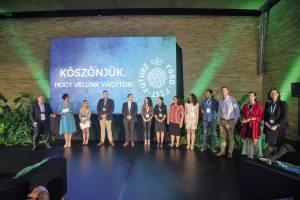
As a closing act of the Future Food Fest speakers and the research team of Expedit Novum gathered on stage
Personalised and precision nutrition battle routine eating
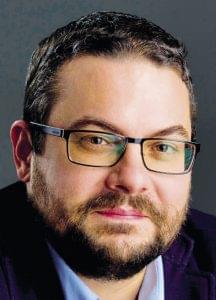
Dr. habil Zsolt
Polereczki
researcher, innovator
Researcher, innovator and executive Dr habil. Zsolt Polereczki was the last speaker, whose topic was personalised nutrition assisted with IT solutions. This way an optimal nutrient intake can be ensured, which is essential if we want to prevent health problems. This step involves kicking routine eating, as people have to be convinced to start eating new foods. Precision nutrition is a real time thing that involves sensory data, an IT background, algorithms and artificial intelligence technology, so that nutrients can be portioned based on actual needs. //
This article is available for reading on p 173-175 of Trade magazin 2022.08-09.
Related news
Related news
No matter how much you save, food and gadgets always take the money
🎧 Hallgasd a cikket: Lejátszás Szünet Folytatás Leállítás Nyelv: Auto…
Read more >



